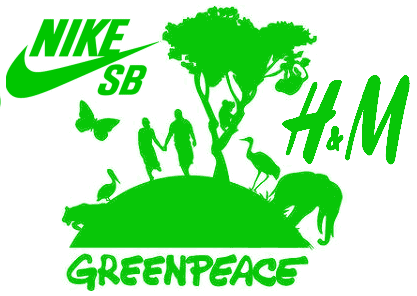 Big NGOs—Greenpeace, 350.org, Avaaz, and so on—play an important role in maintaining capitalism and the status quo.
Big NGOs—Greenpeace, 350.org, Avaaz, and so on—play an important role in maintaining capitalism and the status quo.
These organizations protect the industrial economy and distract us from real solutions. By focusing on technological solutions (which destroy the planet, and are also lucrative industries for green businesspeople), divestment (which also represents a major investment opportunity, and which doesn’t actually slow or stop the burning of fossil fuels), and the commodification of nature through programs like REDD and the concept of “ecosystem services,” mainstream NGOs actually defend the economic system that is killing the planet.
When thousands of people rally for giant public subsidies for industrial energy projects (wind, solar, biomass), the chain is complete. Wealthy individuals donate their funds to big foundations, which fund big NGOs, which mobilize millions of people to support further industrial development. Meanwhile, funding and mainstream support for the real, physical world—to save salmon, or protect forests, or stop overfishing—remains nearly impossible.
That’s not to say that these organizations don’t contain many good-hearted biocentric people who truly care about the natural world. But that is the brilliance—and the danger—of these organizations; they co-opt legitimate dissent into forms of resistance that actually shore up the system.
Recently, Derrick Jensen interviewed Cory Morningstar, a journalist who has been writing about these issues for years. It’s a fascinating interview. You can listen to the interview on YouTube above, or with the player below.
Browse all episodes at the Resistance Radio archive, or at YouTube.

https://lokisrevengeblog.wordpress.com/2016/01/24/no-soil-water-before-100-renwable-energy/
Hey there, seems weird you wouldn’t let me post a retort. So you’ll criticize, but won’t listen back?
Re-pasting:
Remind me: are Trans* people actually people, in DGR’s book?
Last I heard, the answer was no, and that’s when I realized I cannot take you folks seriously. Which is too bad, since you may have something to offer, but certainly not to my trans* friends. So it’s hard to take any comment on movement building from DGR seriously, with your appeal of who to blame next among friends. You aren’t building allies, and the ongoing enviro infighting hasn’t helped our movement become any more intelligent.
I used to like Jensen’s writing, we even brought him in as a keynote speaker when I was in college. Now, Endgame collects dust, and I wouldn’t mislead young activists with it’s calls for self-glorifying freedom fighting.
There are a lot of people who need help before they can help the planet, and I’m not confident that DGR would be patient enough to build relationships with any of them, if they don’t accept your sabre-rattling.
I speak for myself here, not my employer (whom you characterize as being in cahoots with Nike and H&M…?). If you think Greenpeace is in cahoots with the Fortune 500…maybe a review of the literature is in order.
Generally, companies hate us:
http://www.counterpunch.org/2014/02/12/how-the-american-petroleum-institute-spies-on-environmentalists/
https://news.vice.com/article/the-fbi-continues-to-snoop-on-environmentalists
http://www.motherjones.com/environment/2008/04/exclusive-cops-and-former-secret-service-agents-ran-black-ops-green-groups?page=2
http://www.businessinsider.com/greenpeace-fortune-500-deforestation-global-warming-2014-6?op=1
Good luck brining it all down.
– Connor Gibson, Senior Corrupt ENGO Parasite
Hi Connor,
Your comment, as a first timer posting a lot of links, was held for by the spam filter for review.
Our Radical Feminism FAQs make clear that DGR, like other radical feminists, fully recognizes as people those who identify as trans. DGR condemns all discrimination and violence based on how someone wants to dress or express him or herself. DGR is working to dismantle patriarchy, so is definitely working to the benefit of all those who want to be freed from gender stereotypes and expectations. Your friends are welcome to join us.
With the world at stake, it’s crucial that we, as an environmental movement, take a serious look at why we’ve lost so much ground despite decades of activism. I think discussing and questioning tactics, especially of the large organizations which attract most of the money and energy in environmentalism, is valid and necessary. I’m sorry you seem to take it personally, and read such discussion as sabre-rattling. We’re undoubtedly motivated by the same values, and can find much common ground from which to work together.
In the 1990s, the indigenous Canadian people Nuxalk Nation engaged in a campaign of direct action to stop logging on their traditional land in the Great Bear Rainforest. Greenpeace, Sierra Club and Forest Ethics co-opted their movement. While publicly claiming to be brokering a deal with the industry for 40-60 percent conservation, the NGOs gave their blessing to a deal of only 20 percent conservation.
In 2010, 21 logging companies signed a deal known as “The Canadian Boreal Forest Agreement” with several major environmental organizations aimed at silencing all criticism of logging practices in the Boreal Forest.
“With Greenpeace, David Suzuki, Forest Ethics, and Canadian Parks and Wilderness on our side, when someone comes and tries to bully us, the agreement actually requires that they come and work with us in repelling the attack,” said Avrim Lazar, CEO of the Forest Products Association of Canada in a conference about the deal. “We’ll be able to say, fight me, fight my gang.”